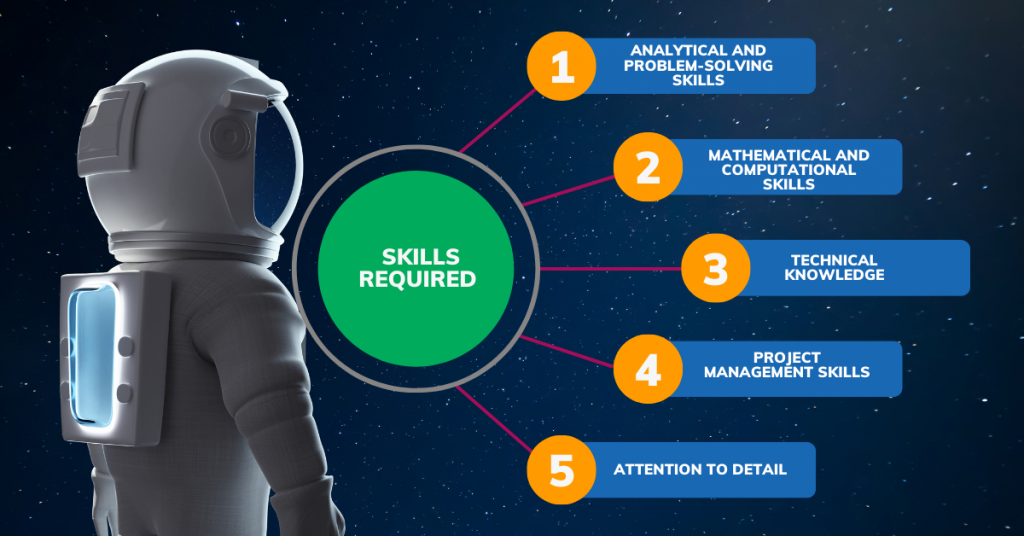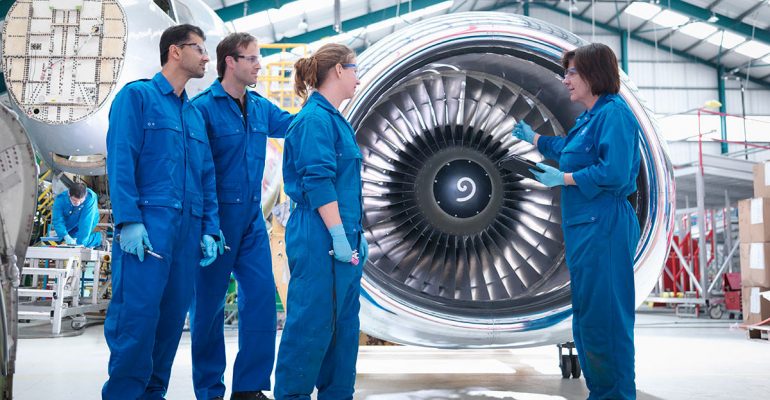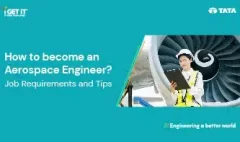Courses for Aerospace Engineering: A Pathway to Success
August 4, 2023 2024-11-11 13:21Courses for Aerospace Engineering: A Pathway to Success
Courses for Aerospace Engineering: A Pathway to Success
Aerospace engineering is a dynamic and ever-evolving field that encompasses the design, development, and testing of aircraft, spacecraft, satellites, and missiles. It is a specialized branch of engineering that requires a deep understanding of mathematics, physics, and engineering principles. If you have a passion for aviation, space exploration, and cutting-edge technology, pursuing aerospace engineering courses could be the perfect choice for you.
In this comprehensive blog, we will explore the world of aerospace engineering and delve into the various online courses for aerospace design engineer, degrees, skills, and requirements needed to embark on a successful career in this exciting field. Whether you are a high school student exploring future career options or a working professional looking to upskill, this article will provide you with valuable insights and resources to navigate your journey in aerospace engineering.
Table of Contents
Is Aerospace engineering in demand?
Yes, the aerospace engineering field is witnessing notable demand. According to a recent report by the Bureau of Labor Statistics, employment opportunities for aerospace engineers are projected to increase by 6% from 2021 to 2031, outpacing the average growth rate for all occupations. This indicates a requirement of approximately 3,800 new aerospace engineers annually in the US during this period.
Aerospace engineering offers a wide range of opportunities for individuals who are fascinated by the principles of flight, the exploration of space, and the development of advanced technological systems.
Let’s take a closer look at some of the reasons why you should consider pursuing a career in aerospace engineering:
1.Thriving Industry: The aerospace industry is a thriving sector that plays a vital role in shaping the world of transportation, defense, and exploration. With advancements in technology and increasing demand for air travel and space exploration, the field of aerospace engineering offers a plethora of exciting opportunities.
2.Cutting-Edge Technology: Aerospace engineers work on the forefront of technological advancements, designing and developing state-of-the-art aircraft, spacecraft, and missiles. From conceptualizing innovative designs to implementing advanced propulsion systems, aerospace engineers are at the forefront of technological innovation.
3.Global Impact: Aerospace engineering has a global impact, contributing to advancements in aviation, space exploration, and defense systems. By pursuing a career in aerospace engineering, you have the opportunity to make a significant impact on the world and contribute to scientific and technological advancements.
4.Career Growth: The demand for aerospace engineers is expected to grow in the coming years, offering excellent career growth opportunities. With the right skills and qualifications, you can explore various career paths, including research and development, design engineering, project management, and consultancy.
Now that we have explored the reasons why aerospace engineering is an exciting and promising field, let’s delve into the courses and educational institutions that can help you kickstart your journey.
Aerospace Engineering Degree and Online Courses
You might be thinking which courses is best for aerospace engineering? To become an aerospace engineer, it is essential to acquire a solid foundation in relevant subjects such as mathematics, physics, and engineering principles. Let’s explore some of the key aerospace engineering courses online and degrees that will equip you with the skills and knowledge needed to excel in the field of aerospace engineering.
1. Bachelor's degree in aerospace engineering
A bachelor’s degree in aerospace engineering is the first step towards building a successful career in this field. This undergraduate program typically spans over three to four years and provides students with a comprehensive understanding of aerospace engineering principles. The curriculum includes a combination of core engineering courses and specialized aerospace engineering subjects.
Some of the key courses you can expect to encounter during your bachelor’s degree include:
- Mathematics for Engineers
- Physics for Engineers
- Introduction to Aerospace Engineering
- Aerodynamics
- Aircraft Structures
- Aerospace Materials
- Flight Mechanics and Control
- Propulsion Systems
- Spacecraft Design
These courses will equip you with the fundamental knowledge and skills required to design, analyse, and test aerospace vehicles and systems. It is important to choose an accredited and reputable university or college that offers a comprehensive aerospace engineering program. Here are some of the leading institutions known for their aerospace engineering courses:
- Massachusetts Institute of Technology (MIT)
- Embry-Riddle Aeronautical University
- Purdue University-Main Campus
- Georgia Institute of Technology-Main Campus
- University of Texas at Austin
- University of Illinois at Urbana-Champaign
- Stanford University
- California Institute of Technology
These institutions offer rigorous and industry-aligned aerospace engineering programs that will lay the foundation for a successful career in this field.
2. Master's degree in aerospace engineering
While a bachelor’s degree is sufficient for entry-level positions in aerospace engineering, pursuing a master’s degree can provide you with a competitive edge and open up more advanced career opportunities. A master’s degree in aerospace engineering allows you to specialize in a particular area of interest and delve deeper into advanced topics.
The coursework in a master’s program typically includes both core aerospace engineering courses and specialized elective courses. Some of the advanced topics you can expect to explore during your master’s degree include:
- Advanced Aerodynamics
- Spacecraft Propulsion
- Composite Materials in Aerospace
- Flight Dynamics and Control
- Aerospace Systems Engineering
- Aerospace Structural Analysis
- Rocket Propulsion
- Computational Fluid Dynamics
A master’s degree in aerospace engineering also provides opportunities for research and thesis projects, allowing you to contribute to cutting-edge research in the field.
3. Online courses for Aerospace Engineering
1. i Get It by Tata Technologies – Aerospace Design Certification Course
Tata Technologies boasts a rich history of providing engineering and digital design solutions. Their aerospace industry clients include leading aviation and aerospace companies such as Boeing, Airbus, GE Aviation, among others. Therefore the online Aerospace design course with certificate from Tata Technologies stands out as a premier choice for aspiring aerospace engineers.
2. Coursera – Introduction to Aerospace Engineering
Provided by Delft University of Technology, this course offers an introduction to aerospace engineering principles, including aircraft performance, stability, and control.
3. Udemy – Fundamentals of Aerospace Engineering:
This course covers the basics of aerospace engineering, including aircraft design, aerodynamics, and space propulsion systems.
4. LinkedIn Learning – Aerospace Engineering Foundations:
Taught by industry experts, this course provides an overview of aerospace engineering principles, including aircraft design, materials, and manufacturing processes.
What are the skills required for Aerospace Engineering ?
Certain skills that are highly required in the field of aerospace engineering are Analytical and Problem-Solving Skills, Mathematical and Computational Skills, Technical Knowledge, Project Management Skills, Attention to Detail, Creativity and Innovation, Communication and Teamwork: Let’s understand them in detail:

3.1 Analytical and Problem-Solving Skills
Aerospace engineers must have strong analytical and problem-solving skills to tackle complex engineering challenges. They need to be able to analyze data, identify problems, and devise innovative solutions.
3.2 Mathematical and Computational Skills
A solid foundation in mathematics is crucial for aerospace engineers. They must be proficient in calculus, differential equations, linear algebra, and numerical methods. Additionally, proficiency in computer programming languages such as MATLAB and Python is highly beneficial.
3.3 Technical Knowledge
Aerospace engineers need to have a deep understanding of engineering principles, aerodynamics, propulsion systems, structural design, and other technical aspects of aerospace engineering. Staying updated with the latest advancements in the field is essential.
3.4 Project Management Skills
Aerospace engineers often work on large-scale projects that require effective project management skills. They must be able to plan, organize, and coordinate various aspects of the project to ensure its successful completion.
3.5 Attention to Detail
Attention to detail is crucial in aerospace engineering to ensure the safety and functionality of aircraft and spacecraft. Engineers must pay close attention to specifications, calculations, and design details to avoid any potential errors or flaws.
3.6 Creativity and Innovation
Aerospace engineering requires creative thinking and innovative problem-solving. Engineers must be able to think outside the box and come up with novel solutions to complex challenges.
3.7 Communication and Teamwork
Aerospace engineers often work in multidisciplinary teams, collaborating with professionals from different backgrounds. Effective communication and teamwork skills are essential for successful project execution.
By developing and honing these skills, you can become a well-rounded aerospace engineer and excel in your career.
Aerospace Engineering Requirements
To pursue a career in aerospace engineering, certain requirements must be met. These requirements may vary depending on the country, educational institution, and specific job position. Here are some of the common requirements for individuals aspiring to become aerospace engineers:
Education
A bachelor’s degree in aerospace engineering or a related field is typically required for entry-level positions. Some employers may prefer candidates with a master’s degree for more advanced roles.
Licensing and Certification
In some countries, aerospace engineers may be required to obtain a professional engineering license. This typically involves completing the required education, passing an examination, and gaining relevant work experience. Certification programs, such as the Aerospace Design Engineer Certificate Program can also add value to your credentials.
Experience
While experience requirements may vary, having practical experience through internships or co-op programs can enhance your chances of securing a job in the aerospace industry. Participating in research projects or working on engineering competitions can also demonstrate your commitment and practical skills.
Technical Skills
Proficiency in computer-aided design (CAD) software, simulation tools, and programming languages is highly desirable in aerospace engineering. Familiarity with industry-specific software and tools can give you a competitive edge.
Clearance and Security
Certain aerospace engineering positions, especially those related to defence and national security, may require security clearance. This involves a thorough background check and assessment of your eligibility to handle sensitive information.
Continuing Education
Aerospace engineering is a rapidly evolving field, and it is important to stay updated with the latest advancements and technologies. Pursuing continuing education, attending workshops, and participating in professional development programs can help you stay ahead in your career.
i GET IT Aerospace Design Engineer Certificate Program
In addition to traditional degree programs, there are also various online courses and certifications available that can enhance your skills and knowledge in aerospace engineering. Online courses offer the flexibility to learn at your own pace and from the comfort of your own home.
One notable certification program in the field of aerospace engineering is the Aerospace Design Engineer Certificate Program offered by i GET IT. This program is designed to provide comprehensive training in software-based aircraft design and covers fundamental aerospace engineering principles.
The Aerospace Design Engineer Certificate Program includes a range of topics such as aircraft performance analysis, structural design, systems integration, and aerodynamics. It is taught by highly educated graduates who are seasoned aeronautical/design engineers with extensive experience in working on government and individual projects.
By completing this certification program, you can enhance your skills in aerospace design and gain a valuable credential that can boost your career prospects in the industry.
Unlock Opportunities in Aerospace with 'i GET IT'!"
Aerospace engineering offers an exciting and rewarding career path for individuals passionate about aviation, space exploration, and cutting-edge technology. By pursuing the appropriate courses and acquiring the necessary skills and qualifications, you can embark on a successful journey in this dynamic field.
Whether you choose to pursue a traditional degree program, enroll in online courses, or obtain certifications, the key is to continuously expand your knowledge and stay updated with the latest advancements in aerospace engineering.
This is where “i GET IT” comes into play. With its dedication to excellence in engineering education, “i GET IT” offers a range of Aerospace Engineering Courses designed to cater to the diverse needs of aspiring aerospace professionals. The platform provides in-depth and up-to-date content that covers a wide spectrum of topics crucial for aspiring engineers.
As a trusted and reputable eLearning solution, “i GET IT” is committed to your success. We offer a wealth of resources, including career tips and informative newsletters, to keep you informed about the latest developments and trends in the engineering field.
Why Choose i GET IT?
i GET IT, by Tata Technologies is an innovative eLearning solution tailored to empower engineers with enhanced proficiency in utilizing cutting-edge MCAD (Mechanical Computer Aided Design) applications and design skills.
We offer a wealth of career tips and in-depth eLearning courses, encompassing not only MCAD but also a wide array of other design solutions. By visiting our website at https://www.myigetit.com, you’ll gain access to a world of knowledge and expertise that can propel your professional growth.
On the top of providing online courses, i GET IT believes in catering excellence and have been in industry for more than 25 years and have provided training to top global OEMs.
Embark on your upskilling journey today with “i GET IT” by Tata Technologies and equip yourself with the skills and knowledge to excel in the world of engineering and design. Take the first step towards unlocking your true potential and creating a brighter future for yourself!
If you should have any questions, please reach out to iproducts@tatatechnologies.com for help or contact us by filling up the form.
Reminder –
If you like this blog please share it using the below share this post button
Manya
Related Posts
PLM Teamcenter Interview Questions and Answers – [HR Expert List]
Hybrid Electric Vehicles Webinar With Kedar Gokhale
Best EV Online Courses with Certification by Tata Technologies
Most Common GD&T Interview Questions & Answers [Expert’s List]
How to Become an Aerospace Engineer?-Job Requirements & Tips
Find
Categories
Latest Posts
Top AutoCAD 3D Commands & Shortcuts with Examples
April 9, 2025What is Engineering Mechanics? – Introduction 101
March 10, 2025Popular Tags



















